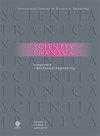短路段可选变道率模型的建立
IF 1.9
4区 工程技术
Q2 ENGINEERING, MULTIDISCIPLINARY
引用次数: 0
摘要
为了计算编织路段的服务水平和密度,公路通行能力手册(HCM)于2010年首次定义了基于变道率的关系来评估编织路段的密度。在这种情况下,准确估计换道率至关重要,但在伊朗德黑兰短于250米的编织段的现场观测显示,HCM2016模型估算值与现场数据存在显著差异。本文利用德黑兰6个编织路段87(15分钟)间隔收集的交通和几何数据,建立了估算编织路段变道率的模型。然后将这87个区间分为69个(地形数据)用于方程,18个(测试数据)用于模型比较。本研究将编织体积和编织段面积作为两个自变量引入编织车辆可选变道率模型,R2=0.74。在R2=0.95的非编织车辆变道模型中,定义了非编织体积和交通固体度两个新变量。最后,利用18个区间对结果进行检验,对比HCM2016模型,表明所开发模型的结果有较好的改善。本文章由计算机程序翻译,如有差异,请以英文原文为准。
Development of an Appropriate Model for the Optional Lane-changing Rate in Weaving Segments with Short Lengths
In order to compute level of service and density in weaving segments, the Highway Capacity Manual (HCM) defined for the first time in 2010 a relationship based on a lane change rate to assess the density of the weaving segment. It is critical to accurately estimate lane changing rate in these situations, but field observations in weaving segments shorter than 250 meters in Tehran, Iran revealed a significant difference between the HCM2016 model estimate and field data. The traffic and geometric data collected at 87 (15-minute) intervals from six weaving segments in Tehran were used to develop models for estimating lane changing rate in weaving segments. These 87 intervals were then divided into 69 (terrain data) for equations and 18 (test data) for model comparisons. Weaving volume and weaving segment area are introduced as two independent variables in the optional lane changing rate model of weaving vehicles in this study, with R2=0.74. Furthermore, for a lane-changing model of non-weaving vehicles with R2=0.95, two new variables of non-weaving volume and traffic solidity were defined. Finally, based on the 18 intervals used to test the results, it showed the improvement of the developed models results compared to HCM2016 models.
求助全文
通过发布文献求助,成功后即可免费获取论文全文。
去求助
来源期刊

Scientia Iranica
工程技术-工程:综合
CiteScore
2.90
自引率
7.10%
发文量
59
审稿时长
2 months
期刊介绍:
The objectives of Scientia Iranica are two-fold. The first is to provide a forum for the presentation of original works by scientists and engineers from around the world. The second is to open an effective channel to enhance the level of communication between scientists and engineers and the exchange of state-of-the-art research and ideas.
The scope of the journal is broad and multidisciplinary in technical sciences and engineering. It encompasses theoretical and experimental research. Specific areas include but not limited to chemistry, chemical engineering, civil engineering, control and computer engineering, electrical engineering, material, manufacturing and industrial management, mathematics, mechanical engineering, nuclear engineering, petroleum engineering, physics, nanotechnology.
 求助内容:
求助内容: 应助结果提醒方式:
应助结果提醒方式:


